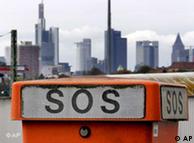Germany | 25.10.2008
German Finance Minister Warns Crisis to Last Until End 2009
Germany's Finance Minister has grimly predicted the global financial crisis will last at least until late 2009 and said it will take years for Germany to assess the real costs of its 480-billion-euro bank rescue package.
In an interview with German weekly Bild am Sonntag, to be published Sunday, German Finance Minister Peer Steinbrueck offered a bleak assessment of Germany's financial health amid growing concerns of a global recession.
"The risk of collapse is far from over. Any all-clear would be wrong," Steinbrueck said. "We're still dealing with a dangerous situation."
The German government's 480-billion-euro ($610 billion) rescue package for troubled banks, approved last week, is to last through 2009.
 Bildunterschrift: Großansicht des Bildes mit der Bildunterschrift: Germany's financial rescue package is the biggest of its kind in Europe
Bildunterschrift: Großansicht des Bildes mit der Bildunterschrift: Germany's financial rescue package is the biggest of its kind in Europe
" We will certainly need it for that duration," Steinbrueck predicted.
He also said it would take years for Germany to gauge whether the rescue package had racked up real costs.
"We won't know whether the rescue plan will entail real costs until between 2010 and 2013 or whether the state can sell the stakes it receives in banks in return for the rescue package and make up the losses," he added.
German banks have been slow to line up for state aid under the rescue plan, with some suggesting the banks feared strict caps on salaries for executives and other restrictions being imposed on them as well as being stigmatized by peers.
Publicly owned regional bank BayernLB this week became the first bank to say it would tap the new fund, while WestLB and HSH Nordbank said on Saturday they would probably follow its lead.
The finance minister also distanced himself from the government's previous goal to balance the federal budget by 2011. Germany this year has already balanced its public budget when adding together its federal, local and social security accounts, but the federal budget itself is in the red.
While saying the financial crisis posed no threat to the government's 2011 budget goal, Steinbrueck added: "But we're not saying that we will get there under any circumstance."
Merkel presses for financial overhaul
Steinbrueck's comments came as German Chancellor Merkel called for tighter regulation and supervision of financial markets at a biannual Asia-Europe summit in Beijing.
"We know that we can influence events in Germany," Merkel said at the conclusion of the summit. "Which is why the government will take measures where we can help specific sectors" that are troubled, she added without going into detail.
 Bildunterschrift: Großansicht des Bildes mit der Bildunterschrift: Merkel has pressed for financial reform during her visit to China
Bildunterschrift: Großansicht des Bildes mit der Bildunterschrift: Merkel has pressed for financial reform during her visit to China
"We can see that trust in the financial markets has yet to be fully restored," Merkel said, following another week of extreme volatility on stock markets in the US, Europe and Asia.
The chancellor also called for a reform of the tattered financial system -- including substantially more oversight -- as the only way to prevent future crises of this nature.
In addition to the bank rescue plan, the German government, an uneasy coalition of Merkel's conservatives and the Social Democrats (SPD), is drawing up a series of measures to boost investment in specific sectors of the economy.
The government has said the auto and construction industries could get help.
More bad news
More bad news hit Germany Friday, with auto giant Volkswagen announcing it would cut output while maintaining it would meet its
2008 sales targets.
The bellwether DAX stock index closed Friday at 4,295.67, down 10 per cent in just a week, as investors reacted to fears in key Asian and European export markets.
On Friday, Germany's Deutsche Bank predicted a severe recession in Germany. In 2009, Germany's economy will contract by 1.5 percent, a spokesman for the bank's research division told the Berliner Zeitung.
Ulrich Kater, chief economist of the Dekabank told newspaper Bild that the German economy had already slipped into a recession in the third quarter of 2008.

Comments